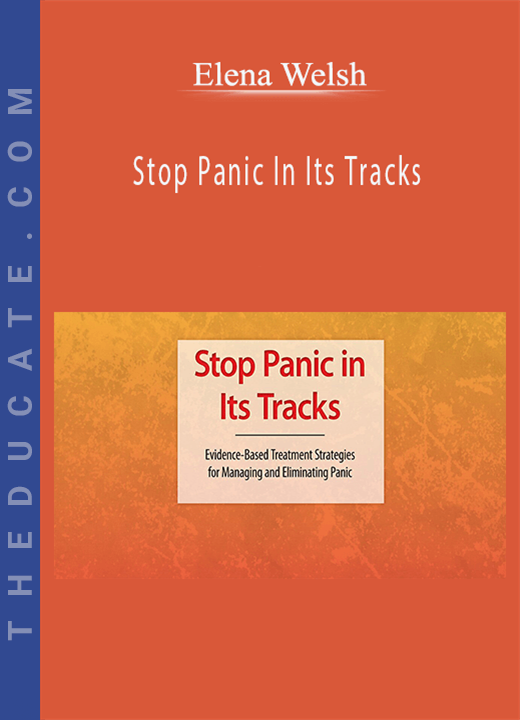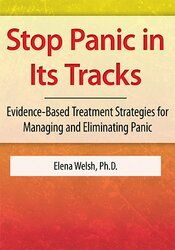Description
-
- Faculty:
- Elena Welsh
- Duration:
- 6 Hours 21 Minutes
- Format:
- Audio and Video
- Copyright:
- Jan 13, 2021
- Differentiate diagnostically between panic disorder and panic attacks
- Provide psychoeducation that is non-pathologizing and immediately useful for clients
- Empower clients to increase their comfort level and accept difficult/distressing thoughts, feelings, and sensations
- Teach clients to preemptively catch and reframe thoughts that fuel anxiety and panic
- Motivate clients to shift behaviors to reduce the severity and frequency of panic/fear reactions
- Guide clients through exposure protocols to manage panic/fear reactions
- Manage your own anxiety about treating panicked and anxious clients
- Panic disorder vs. panic attacks that are secondary to other anxiety disorders
- Psychosocial factors that may exacerbate panic symptoms
- Impact on client’s social and occupational functioning
- Is the client’s support system inadvertently reinforcing panic symptoms?
- Teach clients about the physiology of fearand avoidance in a non-pathologizing manner
- When the body is behaving normally, just at the wrong time!
- Physical sensations that comprise a panic attack
- How short-term relief (avoidance, distraction, etc) isn’t enough to yield long-term wellness
- Teach clients ‘the why’ of exposure before going through it
- Catastrophizing, jumping to conclusions, tunnel vision, emotional reasoning, and overgeneralization
- Tools to help clients gain awareness of and reframe distorted thinking
- Disrupt the link between thoughts and unhelpful/avoidance/escape behaviors
- Help clients critically examine the beliefs they hold about panic and its aftermath
- The importance of client buy-in for exposure to be effective
- How to develop graduated exposure plan
- Subjective Units of Distress (SUDs) ratings to improve clinician-client communication
- In-vivo vs. imaginal exposure
- The importance of remaining in an exposure exercise until fear subsides
- Modify exposure for telehealth
- Values clarification
- Use of metaphors
- Exercises to increase comfort with difficult emotions and sensations
- Breathing skills to interrupt worry thoughts and slow down physiological panic symptoms
- Relaxation techniques to reduce vulnerability to panic
- Grounding techniques to lower the intensity
- How a daily mindfulness practice can reduce panic
- Individualized methods of tracking success and challenges
- Help clients maintain consistent skills practice and reduce avoidance behaviors
- Maintain a panic attack progress tracking tool
- Connect treatment to client’s goals and values
- Anxiety and panic during challenging times
- Increased anxiety rates during public health crisis
- Complicating factors of hypochondriasis and panic disorder
- Limitations of the research and potential risks
Elena Welsh – Stop Panic In Its Tracks: Evidence-Based Treatment Strategies for Managing and Eliminating Panic Attacks
Description
Clients who are experiencing panic want relief from their suffering. And given that it took a mountain of courage just to show up at your door, you want to help them as quickly and effectively as you can. But without proper training, panic attacks can be very confusing and difficult to treat. It is very common that well-intentioned therapists inadvertently reinforce avoidance or escape behaviors, thereby prolonging recovery, worsening symptoms—leading to client drop out.
Watch anxiety expert and author, Elena Welsh, Ph.D., as she shares her treatment secrets that consistently improve the lives of her clients suffering from panic and anxiety. Using the best techniques from Acceptance and Commitment Therapy (ACT), mindfulness, and Cognitive Behavioral Therapy (CBT), Dr. Welsh lays out practical, step-by-step integrated treatment strategies that you can use right away, including how to:
Do not let another client walk out that door wondering if they could live without panic and anxiety.
Purchase today!
Handouts
| Manual – Stop Panic in Its Tracks (2.3 MB) | 101 Pages | Available after Purchase |
Outline
Assessment: Accurately Diagnose Panic and Anxiety Disorders
INTEGRATING ACT, CBT, & MINDFULNESS INTO YOUR THERAPEUTIC TOOLBOX
Psychoeducation: The Essential Foundation of Anxiety Treatment
Cognitive Behavior Therapy (CBT): Target Cognitive Distortions that are Common in Anxiety
Exposure Techniques: Breaking the Anxiety and Panic Cycle
Acceptance and Commitment Therapy (ACT): Teaching Clients to “Drop the Rope”
Tools for Calming the Body in the Midst of Panic
Recovery Maintenance Tools: Make Sure Therapy is Working and Help Clients Stay on Track
Other Clinical Considerations
Faculty
Elena Welsh, PhD Related seminars and products: 1
The Access Tree
Elena Welsh, Ph.D., is a licensed clinical psychologist who specializes in working with clients with anxiety disorders from all walks of life in both inpatient and outpatient treatment settings. She also works with a wide range of mood and depressive disorders, including bipolar disorder, major depression, and post-traumatic stress disorder/trauma-related mental health issues.
Dr. Welsh has published articles in various medical and research journals and is the author of The Cognitive Therapy Workbook for Panic Attacks; Trauma Survivors’ Strategies for Healing: A Workbook to Help You Grow, Rebuild, and Take Back Your Life; Getting to Good: A Guided Journal; and 5-Minute Stress Relief: 75 Exercises to Quiet Your Mind and Calm Your Body. She has served as an adjunct faculty member at various universities in Los Angeles.
Dr. Welsh received her doctorate degree from the University of Maryland, Baltimore County and completed advanced clinical training through a postdoctoral fellowship at Gateways Psychiatric Hospital in Los Angeles.
Speaker Disclosures:
Financial: Elena Welsh maintains a private practice. She is an author and receives royalties. Dr. Welsh is a supervising psychologist at the Department of State Hospitals-Metropolitan. She is a faculty member at Antioch University. Dr. Welsh receives a speaking honorarium from PESI, Inc.
Non-financial: Elena Welsh has no relevant non-financial relationship to disclose.







11 reviews for Elena Welsh – Stop Panic In Its Tracks: Evidence-Based Treatment Strategies for Managing and Eliminating Panic Attacks
There are no reviews yet.